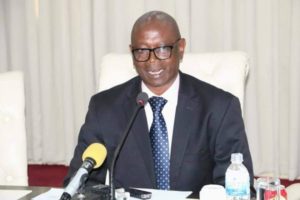TRRC contracts QTV to record sessions for media use
The Truth, Reconciliation and Reparation Commission briefs media as it prepares to begin hearings on January 7

The Truth, Reconciliation and Reparation Commission (TRRC) has announced on Monday that it has contracted QTV to provide footages and audios of proceedings for media usage.
The TRRC, established to probe the human rights violations of the former leader Yahya Jammeh, said it will provide all videos and audios of their proceedings to any media house that would need them.
The press conference at the Dunes Resort where the Commission is housed was meant to brief the media on how journalists are supposed to cover the proceedings.
The proceedings of the TRRC is expected to expose some highly sensitive information of murder, torure and disappearances of people’s relatives.
Faal, the lead counsel of the Commission, said journalists will be required to exercise caution and responsible reporting.
He emphasized that the Commission will not take kindly any “malicious” reporting, adding that they could revoke the accreditation of any journalists found wanting.
“Some witnesses will request anonymity and there is no way you can reveal their identity,” said lead counsel Essa Faal.
Faal said journalists may also be required to refrain from publishing or airing certain information that could jeopardize national security and safety of witnesses or their associates.
Faal said the commission will protect the identity of witnesses that come before it as it sees it fit and in such cases, journalists will be under strict order not to divulge such informations.
He said their recordings of the proceedings of the Commission that involve “protected sources” or witnesses will be redacted before shared with the media.
“We are urging all journalists to take special care when reporting on the proceedings,” advised Adelaide Sosseh, a commissioner on the Commission.
The mandate of the TRRC is to provide a historical account of the human rights violations that happened in the country over the 22-year period of Jammeh.
The Commission is tasked to investigate how the country got to the coup and how Jammeh was able to sustain the system of brute he presided over for 22 years in order to prevent any future reoccurrence.
The Commission will look into both the failures of the people and institutions that led to the dictatorship.
Meanwhile, the Commission will begin its hearing, according to Faal, in Chronological order starting from 1994, July to December 2016 when Jammeh left the country.
“We want to know how we created a dictator whose mere utterances became a law,” said Faal.
The Commission has announced it will start accrediting journalists commencing January 3.


Comments are closed.